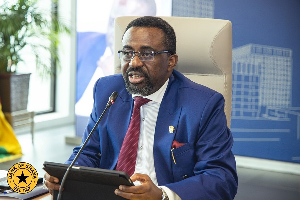By Cynthia Egboboh
Copyright businessday

The federal government has revoked the operating licence of Oritsemeyin Rig, citing a critical drilling error that posed serious safety and operational risks in the course of well operations. The directive, issued by the Nigerian Upstream Petroleum Regulatory Commission (NUPRC), mandates the rig to cease all activities upon completion of its current drilling assignment.
The development was conveyed in a letter dated September 11, 2025, and addressed to Selective Marine Services Limited (SMSL), operators of the Oritsemeyin Rig. The notice was signed by NUPRC’s Commission Chief Executive, Gbenga Komolafe, who underscored the regulator’s responsibility to uphold international best practices and enforce strict compliance with Nigeria’s petroleum laws.
According to NUPRC, the decision followed an exhaustive review of the drilling operations on the UDIBE-2 wellbore, during which a “kick” was recorded. The incident, which caused several hours of Non-Productive Time (NPT), led to additional costs for operators and forced a costly sidetrack of the well.
A kick occurs when fluids such as oil, gas, or water from a reservoir enter the wellbore due to an imbalance between formation pressure and the pressure within the well. If uncontrolled, the situation can escalate into a blowout—an uncontrolled release of hydrocarbons that poses significant risks to personnel, assets, and the environment.
“The Commission found that the occurrence of the kick and its mismanagement during the UDIBE-2 drilling operation created a material breach of safety protocols and operational standards,” the NUPRC explained in a statement on Friday. “Such lapses compromise not only operational integrity but also public and environmental safety.”
Failed Resolution Attempts
Before revoking the licence, NUPRC said it engaged SMSL through formal processes designed to achieve an amicable resolution. On June 5, 2025, the regulator issued a notice of culpability in line with Section 97 of the Petroleum Industry Act (PIA) 2021, giving the company 21 days to respond. A reminder letter followed on July 9, 2025.
Despite these interventions, the Commission said no satisfactory resolution was reached, even after the expiration of the stipulated period. This failure, it added, left the Commission with no option but to exercise its statutory powers under the PIA.
Read also: FG revokes operating license of Oritsemeyin rig over drilling error
“Consequent upon the foregoing and pursuant to the relevant powers conferred on the Commission under the extant Petroleum Industry Act 2021, the annual licence to operate granted to Selective Marine Services Limited for the Oritsemeyin Rig is hereby revoked,” the letter stated.
In addition, the Commission announced that the Oritsemeyin Rig has been disqualified from all renewal protocols with immediate effect.
Upholding Safety and Industry Standards
The NUPRC emphasised that the revocation aligns with its mandate under the PIA 2021 to enforce compliance with good oilfield practices, operational safety, and technical standards. The regulator stressed that strict enforcement is crucial to safeguarding both economic and environmental sustainability in Nigeria’s oil and gas sector.
“This action is not only punitive but corrective,” an industry official familiar with the matter noted. “It sends a strong signal to contractors and operators that lapses in well control and safety management will not be tolerated, especially given the catastrophic consequences that can result from a blowout.”
Industry experts said the revocation also reflects Nigeria’s increasing emphasis on accountability in the upstream sector. With global energy markets demanding stricter adherence to environmental and safety protocols, regulators are under pressure to ensure that operations meet international benchmarks.
For SMSL, the decision represents a significant setback. The company may face both financial and reputational consequences, as its exclusion from renewal processes could limit its future participation in Nigeria’s upstream activities.
Broader Implications
Analysts note that the decision could influence industry practices, pushing rig operators to invest more heavily in training, monitoring systems, and well-control technologies. “The cost of non-compliance is now crystal clear,” said one Lagos-based oilfield services consultant. “Operators will have to rethink how they approach risk management if they want to stay competitive.”
As Nigeria works to optimise oil production while balancing safety and sustainability, the NUPRC’s move highlights the delicate balance regulators must strike between encouraging investment and enforcing discipline in a high-risk industry.
With the Oritsemeyin Rig now sidelined, the episode underscores how drilling missteps, even if contained, can trigger far-reaching consequences in Nigeria’s oil sector.



